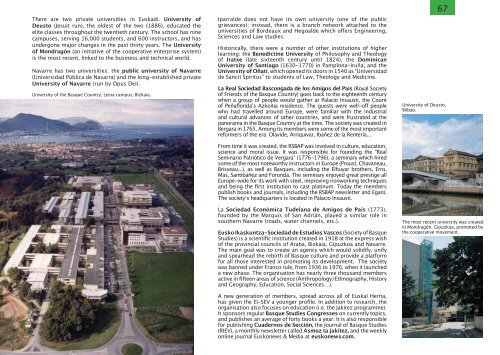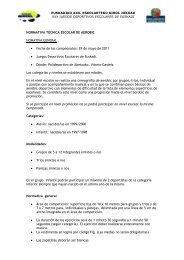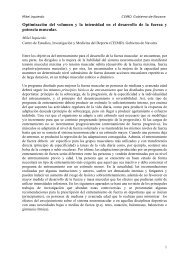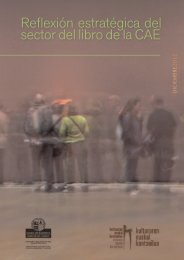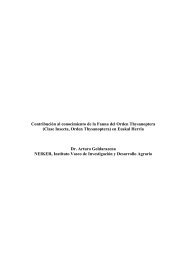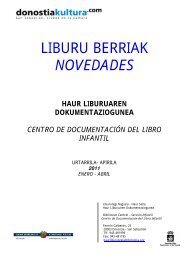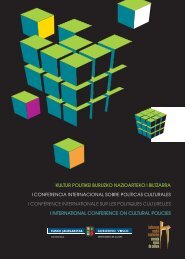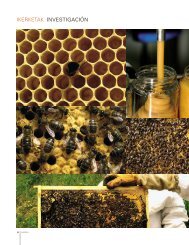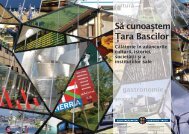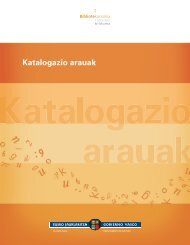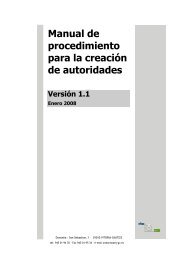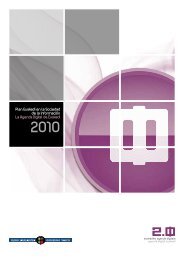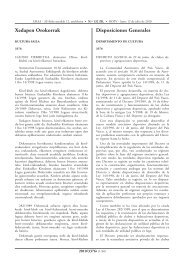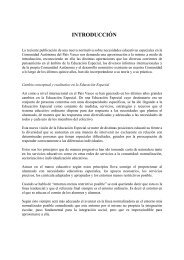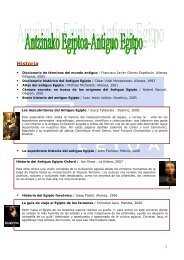The Basque Country (pdf, 4,3Mb) - Kultura Saila - Euskadi.net
The Basque Country (pdf, 4,3Mb) - Kultura Saila - Euskadi.net
The Basque Country (pdf, 4,3Mb) - Kultura Saila - Euskadi.net
You also want an ePaper? Increase the reach of your titles
YUMPU automatically turns print PDFs into web optimized ePapers that Google loves.
<strong>The</strong>re are two private universities in <strong>Euskadi</strong>. University of<br />
Deusto (Jesuit run), the oldest of the two (1886), educated the<br />
elite classes throughout the twentieth century. <strong>The</strong> school has nine<br />
campuses, serving 16,000 students, and 600 instructors, and has<br />
undergone major changes in the past thirty years. <strong>The</strong> University<br />
of Mondragón (an initiative of the cooperative enterprise system)<br />
is the most recent, linked to the business and technical world.<br />
Navarre has two universities: the public university of Navarre<br />
(Universidad Pública de Navarra) and the long-established private<br />
University of Navarre (run by Opus Dei).<br />
University of the <strong>Basque</strong> <strong>Country</strong>, Leioa campus, Bizkaia.<br />
Iparralde does not have its own university (one of the public<br />
grievances); instead, there is a branch <strong>net</strong>work attached to the<br />
universities of Bordeaux and Hegoalde which offers Engineering,<br />
Sciences and Law studies.<br />
Historically, there were a number of other institutions of higher<br />
learning: the Benedictine University of Philosophy and <strong>The</strong>ology<br />
of Iratxe (late sixteenth century until 1824), the Dominican<br />
University of Santiago (1630-1770) in Pamplona-Iruña, and the<br />
University of Oñati, which opened its doors in 1540 as “Universidad<br />
de Sancti Spiritus” to students of Law, <strong>The</strong>ology and Medicine.<br />
La Real Sociedad Bascongada de los Amigos del País (Royal Society<br />
of Friends of the <strong>Basque</strong> <strong>Country</strong>) goes back to the eighteenth century<br />
when a group of people would gather at Palacio Insausti, the Count<br />
of Peñafloridaʼs Azkoitia residence. <strong>The</strong> guests were well-off people<br />
who had travelled around Europe, were familiar with the industrial<br />
and cultural advances of other countries, and were frustrated at the<br />
panorama in the <strong>Basque</strong> <strong>Country</strong> at the time. <strong>The</strong> society was created in<br />
Bergara in 1765. Among its members were some of the most important<br />
reformers of the era: Olavide, Arriquivar, Ibañez de la Rentería...<br />
From time it was created, the RSBAP was involved in culture, education,<br />
science and moral issue. It was responsible for founding the “Real<br />
Seminario Patriótico de Vergara” (1776-1796), a seminary which hired<br />
some of the most noteworthy instructors in Europe (Proust, Chavaneau,<br />
Brisseau...), as well as <strong>Basque</strong>s, including the Elhuyar brothers, Erro,<br />
Mas, Santibáñez and Foronda. <strong>The</strong> seminary enjoyed great prestige all<br />
Europe-wide for its work with steel, improving ironworking techniques<br />
and being the first institution to cast platinum. Today the members<br />
publish books and journals, including the RSBAP newsletter and Egan).<br />
<strong>The</strong> societyʼs headquarters is located in Palacio Insausti.<br />
La Sociedad Económica Tudelana de Amigos de País (1773),<br />
founded by the Marquis of San Adrián, played a similar role in<br />
southern Navarre (roads, water channels, etc.).<br />
Eusko Ikaskuntza-Sociedad de Estudios Vascos (Society of <strong>Basque</strong><br />
Studies) is a scientific institution created in 1918 at the express wish<br />
of the provincial councils of Araba, Bizkaia, Gipuzkoa and Navarre.<br />
<strong>The</strong> main goal was to create an agency which would solidify, unify<br />
and spearhead the rebirth of <strong>Basque</strong> culture and provide a platform<br />
for all those interested in promoting its development. <strong>The</strong> society<br />
was banned under Franco rule, from 1936 to 1976, when it launched<br />
a new phase. <strong>The</strong> organisation has nearly three thousand members<br />
active in fifteen areas of science (Anthropology/Ethnography, History<br />
and Geography, Education, Social Sciences…).<br />
A new generation of members, spread across all of Euskal Herria,<br />
has given the EI-SEV a younger profile. In addition to research, the<br />
organisation also focuses on education (i.e. the Jakitez programme).<br />
It sponsors regular <strong>Basque</strong> Studies Congresses on currently topics,<br />
and publishes an average of forty books a year. It is also responsible<br />
for publishing Cuadernos de Sección, the Journal of <strong>Basque</strong> Studies<br />
(RIEV), a monthly newsletter called Asmoz ta Jakitez, and the weekly<br />
online journal Euskonews & Media at euskonews.com.<br />
67<br />
University of Deusto,<br />
Bilbao.<br />
<strong>The</strong> most recent university was created<br />
in Mondragón, Gipuzkoa, promoted by<br />
the cooperative movement.


